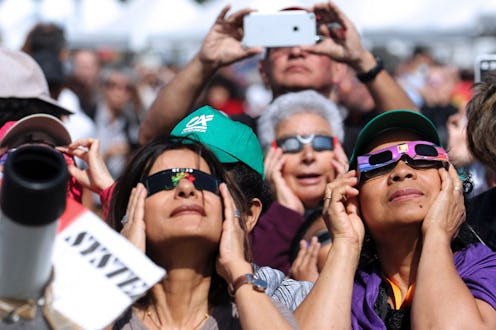Life
How A Solar Eclipse Could REALLY Make You Go Blind

I know, it sounds like clickbait, but there's a lot of truth to what your mother always told you about how looking at a solar eclipse can be dangerous. Astronomers and opticians agree: the threat of temporary or permanent blindness is very real.
I know what you're thinking: you look at the sun every day and you can still see just fine. Or, maybe you're thinking that your designer polarized sunglasses will surely do the trick. But actually, the sun's effect on our eyes during an eclipse is much different than it is every other day, and no, sunglasses are not strong enough to filter out the harmful rays of the sun during an eclipse. This is not the kind of thing you want to wing — if you do, the eclipse might be the last thing you ever see.
Think about it this way, on an average sunny day when we look at the sun, we squint — a built-in reaction our eyes are programmed to do, part of a slew of protective measures our eyes take to keep the vulnerable part of our eyes safe. Pretty cool, right? But even so, after looking at the sun, we often see lingering stamps of light in our field of view — proof that some of the sun's light made an impression on a sensitive part of our eye's anatomy. Though luckily, it's just temporary.
During an eclipse, the dark shadow of the moon against the bright rays of the sun ignites some confusion within our optic systems. Our eyes will be drawn to focus on the dark shadow, which means our sun protective measures won't be properly called to action — our eyes will be in "dark mode," if you will. So when we look over at the sun, the vulnerable part of our eyes will be completely unprotected — because your eyes cannot switch into "bright mode" quickly enough. Our eyes just aren't programmed to safely look at darkness and extreme brightness at the same time — which is fine, because eclipses are incredibly rare. Our eyes can't properly protect themselves, and as a result, lots of harmful rays (including infrared radiation, ultraviolet radiation, and excessive blue light) get full access to our neural tissue. This exposure can cause injury to the retina, resulting in temporary or permanent blindness.
So, if you plan on watching the eclipse, with you most certainly should, you'll need to take protective measures. Get yourself some NASA-approved eyewear to safely observe the eclipse with lenses that filter out all of the harsh rays. A bonus, because the glasses also increase the contrast of light to dark and will make the sight look even more dramatic than it already is. Order a multipack and be a hero when your friends show up to the eclipse viewing party without proper protection.